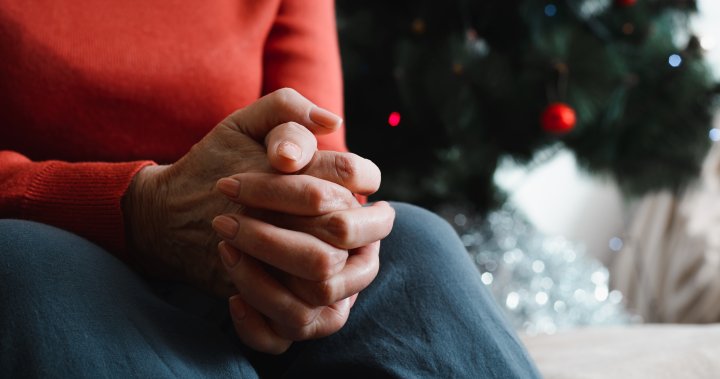As Canadians enjoy the festivities in the next few weeks, some of the country’s seniors may be going through the holidays alone.
While loneliness needs to be combatted at every part of the year, experts say the holiday season can be particularly challenging.
Toronto-area senior Hyman Blajchman, 86, is facing another holiday alone in his home since his wife Yvonne passed away in 2012. While he spends time with his children and grandchildren that sense of loneliness is still there.
“You keep losing friends as the months go by and the years go by,” he said. “When you lose a member from your family, so in my case my wife … it’s like losing a limb, and what if you lose a limb? You miss a lot.”
Blajchman’s story is not unusual. A report from the National Institute on Ageing (NIA) earlier this month found that 41 per cent of Canadians aged 50 years or older are at risk of social isolation and up to 58 per cent in that group have experienced loneliness.

Dr. Samir Sinha, the director of geriatrics at Sinai Health and University Health Network in Toronto and the director of health policy research at the NIA, told Global News that severe loneliness is the equivalent of smoking 15 cigarettes a day and can have significant health consequences.
During the holiday season, people experiencing social isolation may find that feeling heightened.
Get the latest National news.
Sent to your email, every day.
“The holiday time can be quite difficult for older adults who may have lost key family members or friends, who may have health conditions that might limit their ability to get out and about and gather with others,” he said.
Sinha noted that being unable to gather with others may cause more mental distress, anxiety or depression and could contribute to heart disease or increase the risk of dementia.
He said being able to connect with others can have a number of health benefits, with studies showing those 75 and older who don’t smoke, get regular exercise and maintain meaningful social connections often live five years longer than those who don’t.
Fostering connections can be a benefit for many people, according to the University of Toronto’s Dr. Franco Taverna.
“Research has shown that it doesn’t take very many close friendships to improve one’s life,” he told Global News. “It’s not the 400 Facebook friends that are contributing to the quality of life. It’s the small handful of family and friends that become more closer connections that really contribute to quality of life and quality of health, including mental health.”
Taverna is one of the brains behind a “companion” platform called CompanionLink that looks at creating those connections.
He founded it with David Kepes, who became friends with Blajchman through the platform.
Kepes said loneliness can impact anyone and can occur for various reasons, and the holidays can magnify those feelings.

“We take time for loved ones,” he told Global News. “But if you don’t have those people around you, I think it can be an especially painful time because it really enforces that absence.”
Kepes said through his companionship with Blajchman, they’ve gained stories, memories and cultural experiences, such as different holiday celebrations like Christmas or Hanukkah.
Small efforts can go a long way in making a difference in a senior’s life, the experts say.
Dr. Barbara Clive, a geriatric medicine specialist, told Global News that families should try to include seniors in their holiday activities, while not overwhelming them with big groups or crowds.
“We do have to remember that the gift of time is one of the most important things,” she said.
Having them help wrap presents, set the dinner table or with meal preparation can make them feel included, she noted. And if a family member has a cognitive impairment or issue, such as dementia, to consider taking the event to them so they can stay in a more familiar environment.
According to Sinha, some seniors can see it as a call to action for them to look at their networks and reach out to see if they have holiday plans that can include others or create an event to gather with others.
This could include giving a ride to the event, or even ensuring there are accommodations — such as if someone potentially deals with urinary incontinence, to ensure there is a bathroom nearby.
It can also just be knocking on a neighbour’s door.
It’s a move Blajchman said should happen more.
“One thing we could do generally is smile, say hello to someone else, just don’t ignore the person,” he said. “You’ve got to make an effort, ring the doorbell … it’s not only on holidays, we should be doing that all the time.”
© 2023 Global News, a division of Corus Entertainment Inc.










